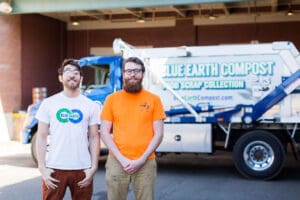 Blue Earth Compost provides compost collection services for residents in Connecticut and municipalities and businesses in Connecticut, Massachusetts, New York, and Rhode Island. The startup launched in 2013 and has been innovating and evolving since. MetroHartford Alliance Content Manager Nan Price checked in with Guru of Marketing & Business Expansion Samuel King for a company update.
Blue Earth Compost provides compost collection services for residents in Connecticut and municipalities and businesses in Connecticut, Massachusetts, New York, and Rhode Island. The startup launched in 2013 and has been innovating and evolving since. MetroHartford Alliance Content Manager Nan Price checked in with Guru of Marketing & Business Expansion Samuel King for a company update.
NAN PRICE: What types of challenges did your business face due to the COVID-19 pandemic? Any silver linings?
SAMUEL KING: The beginning of the pandemic was really difficult. We had to navigate an unprecedented situation with information that was evolving daily. In addition to keeping our operations afloat, we needed to ensure the safety of our team and our customers.
Many of our commercial customers closed or suspended service. We had to apply for PPP and other emergency funding and that was very stressful. The silver lining was that, throughout the pandemic, the residential side of our business grew at a rate we hadn’t really seen before. The momentum has, for the most part, stuck around, which has helped our business to come out of the pandemic in a good place.
Now the commercial businesses are starting to bounce back. Somewhere around 80% to 90% of the businesses that had stopped using our service have returned, so we’re starting to grow that as well.
We can thank a number of people in our community and our industry for helping us maintain and grow through a difficult period. It’s really great to see how these people came together to help each other.
NAN: Tell us a little about the overall business evolution.
SAMUEL: In terms of the business evolution, I think we’re kind of the tip of the spear in our industry. We identified an issue about eight and a half years ago that wasn’t on a lot of people’s radar. It was something we cared about a lot and we thought that maybe others felt the same.
We knew there was some kind of framework for what we wanted to do because similar businesses a couple of years older than us existed in other parts of the country and they’d been successful. So, there was a template that we kind of took and ran with in our own way.
But now there’s a lot more consciousness around the concept of composting. More people are aware of the ill detriments of climate change and soil erosion and industrial agriculture. We’re running out of capacity for waste here in Connecticut and the way we’re handling things is polluting and harming people, often those who have been marginalized. So, there are a lot of reasons for people to be thinking about the future of waste and sustainability.
A business like ours is ready to provide solutions. We’re seeing people reach out to us with those kinds of questions. We’re also working our way toward municipal partnerships. We want to work with towns and cities to implement food diversion programs so we’re able to mitigate the problems with capacity and prices and, obviously, at the end of the day, the environment.
NAN: Tell us about your involvement with Hartford.
SAMUEL: We’re based in Hartford. We moved into our current operation space in April 2016. We’re moving to a new headquarters soon that’s about three times as big, but we’re staying within Hartford.
We wanted to stay in the city of Hartford. We received some help from the Mayor’s Office of Economic Development. Right now, the commercial warehousing market is in high demand. It’s a terrible time to move, but we’re fortunate. We found a good landlord and we’re excited about the new space and glad to be staying in Hartford.
NAN: What’s next?
SAMUEL: We’ll be announcing an equity crowdfunding campaign round soon. We want to raise equity capital to expand our operations and help us continue to do what we do—do it better, do it bigger, and do more different things.
Read the entire interview at Innovation Destination Hartford
